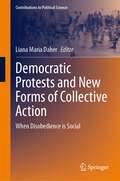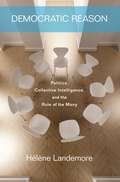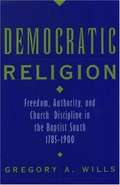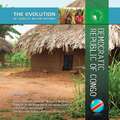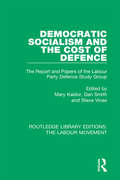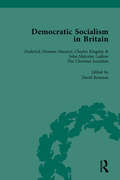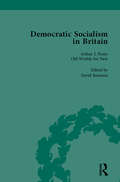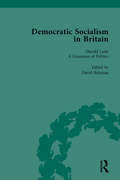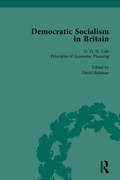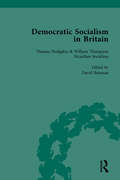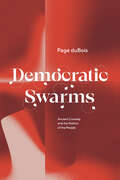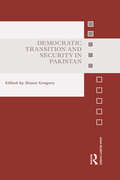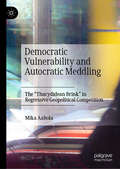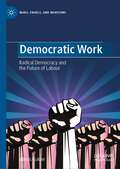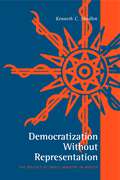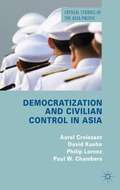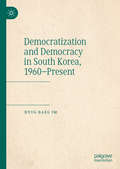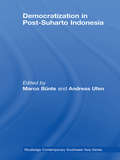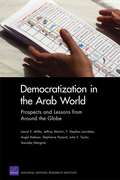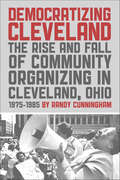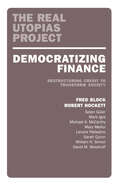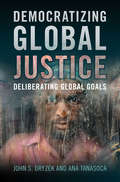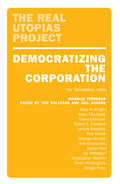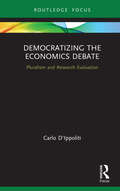- Table View
- List View
Democratic Protests and New Forms of Collective Action: When Disobedience is Social (Contributions to Political Science)
by Liana Maria DaherFollowing a dialogic and interdisciplinary approach, this book highlights changes in the concept and action of disobedience, presenting a theoretical framework and applied case studies.Disobedience has traditionally been played out through collective actions and protests which configure and propose alternative social scenarios to the status quo. Today, in a changing socio-historical context, disobedience represents a mode of political participation and a form of an active citizenship attempt to correct authoritarian drifts. Furthermore, it often highlights social problems and morally controversial issues. Disobedience is not only a right granted to the individual within democratic systems and/or duty imposed in the interest of society in a pro-social sense, i.e. defense of human rights and a tendency towards equalization, but it also became an alternative process, often symbolic, of construction of reality.The book focuses on a) reconstructing the concept of social disobedience and the field's state of the art from an innovative, contemporary, theoretical, and conceptual perspective and b) analyzing its phenomenology within a specific territorial horizon, with the objective of uncovering social and pro-social aspects related to today’s forms of disobedience. The book therefore will appeal to students, scholars, and researchers of contemporary political theory, political science, democratization studies, social movement studies, criminology, legal theory, and moral philosophy.
Democratic Reason: Politics, Collective Intelligence, and the Rule of the Many
by Hélène LandemoreIndividual decision making can often be wrong due to misinformation, impulses, or biases. Collective decision making, on the other hand, can be surprisingly accurate. In Democratic Reason, Hélène Landemore demonstrates that the very factors behind the superiority of collective decision making add up to a strong case for democracy. She shows that the processes and procedures of democratic decision making form a cognitive system that ensures that decisions taken by the many are more likely to be right than decisions taken by the few. Democracy as a form of government is therefore valuable not only because it is legitimate and just, but also because it is smart. Landemore considers how the argument plays out with respect to two main mechanisms of democratic politics: inclusive deliberation and majority rule. In deliberative settings, the truth-tracking properties of deliberation are enhanced more by inclusiveness than by individual competence. Landemore explores this idea in the contexts of representative democracy and the selection of representatives. She also discusses several models for the "wisdom of crowds" channeled by majority rule, examining the trade-offs between inclusiveness and individual competence in voting. When inclusive deliberation and majority rule are combined, they beat less inclusive methods, in which one person or a small group decide. Democratic Reason thus establishes the superiority of democracy as a way of making decisions for the common good.
Democratic Religion: Freedom, Authority, and Church Discipline in the Baptist South, 1785-1900
by Gregory A. WillsWills demonstrates how a denomination of freedom-loving individualists came to embrace an exclusivity spirituality--a spirituality that continues to shape Southern Baptist churches in contemporary conflicts between moderates who urge tolerance and conservatives who require belief in scriptural in errancy. Wills's analysis advances our understanding of the interaction between democracy and religious authority, and will appeal to scholars of American religion, culture, and history, as well as to Baptist observers.
Democratic Republic of Congo (The Evolution of Africa's Major Nations)
by Rita MiliosThe name Democratic Republic of the Congo is a misnomer: the country has never been truly democratic or a republic. For decades this country in central Africa, which was once known as Zaire, was ruled by a brutal and corrupt dictator, Mobutu Sese Seko. Since the mid-1990s, when Mobutu's government was overthrown, various groups within Congo have been fighting for power. Although a peace agreement was signed in 2003 and a new constitution adopted in 2006, fighting has continued in the eastern part of the country. Overall, the Second Congo War involved nine African nations and caused more than 5.4 million deaths, making it the deadliest conflict since World War II. The Democratic Republic of the Congo is the second-largest country in Africa and possesses a wealth of natural resources. However, the government still has no control over large areas of the country, and the years of fighting have devastated the economy. Although the prospects for peace have improved, it will take years for Congo to fully recover from its devastating civil war.
Democratic Socialism and the Cost of Defence: The Report and Papers of the Labour Party Defence Study Group (Routledge Library Editions: The Labour Movement #20)
by Mary Kaldor, Dan Smith and Steve VinesFirst published in 1979. The report of the Labour Party Defence Study Group, which met from early 1975 to mid-1977, represents a unique attempt to portray defence policy in the context of disarmament and the need to restructure and control the institutions of defence – in particular the defence industry. The report presented the fullest study made by any British political party concerning the implications and consequences of its stated defence policy, and embodied an examination of defence from the perspective of approaches of disarmament. At the same time, the search for a new policy in international relations was harmonised with the further development of a new industrial strategy, concentrating upon the potential for converting part of military industry to civil work. This work which presents a distinctive intervention in the general debate concerning defence policy, industrial and technological planning, economic priorities and public policy, will be of considerable relevance to both specialists in each of these fields as well as the general reader.
Democratic Socialism in Britain, Vol. 2: Classic Texts in Economic and Political Thought, 1825-1952
by David ReismanThe texts in this collection of 10 volumes demonstrate both the diversity and continuity in British theories of democratic socialism. The selection encompasses the Ricardian socialists, the Christian socialists, and the Fabian socialists. Volume 2 includes contributions from .Frederick Denison, Maurice Charles Kingsley and John Malcolm Ludlow, the ‘Christian Socialists’.
Democratic Socialism in Britain, Vol. 5: Classic Texts in Economic and Political Thought, 1825-1952
by David ReismanThe texts in this collection of 10 volumes demonstrate both the diversity and continuity in British theories of democratic socialism. The selection encompasses the Ricardian socialists, the Christian socialists, and the Fabian socialists. Volume 5 includes ‘Old Worlds for New; A Study of the Post-Industrial State’ by Arthur J. Penty.
Democratic Socialism in Britain, Vol. 6: Classic Texts in Economic and Political Thought, 1825-1952
by David ReismanThe texts in this collection of 10 volumes demonstrate both the diversity and continuity in British theories of democratic socialism. The selection encompasses the Ricardian socialists, the Christian socialists, and the Fabian socialists. Volume 6 includes ‘A Grammar of Politics’ by Harold Laski.
Democratic Socialism in Britain, Vol. 7: Classic Texts in Economic and Political Thought, 1825-1952
by David ReismanThe texts in this collection of 10 volumes demonstrate both the diversity and continuity in British theories of democratic socialism. The selection encompasses the Ricardian socialists, the Christian socialists, and the Fabian socialists. Volume 7 includes ‘Principles of Economic Planning’ by G.D.H.Cole.
Democratic Socialism in Britain: Classic Texts in Economic and Political Thought, 1825-1952
by David ReismanThe texts in this collection of 10 volumes demonstrate both the diversity and continuity in British theories of democratic socialism. The selection encompasses the Ricardian socialists, the Christian socialists, and the Fabian socialists. Volume 1 includes ‘Labour Rewarded and ‘Labour Defended’.
Democratic Societies and Their Armed Forces: Israel in Comparative Context
by Stuart A. CohenThese papers are an edited selection from the BESA conference of 1998. They present an overview of transformations in societal-military relations in the western world, and the specific manifestations in Israel.
Democratic Swarms: Ancient Comedy and the Politics of the People
by Page duBoisConsiders how ancient Greek comedy offers a model for present-day politics. With Democratic Swarms, Page duBois revisits the role of Greek comedy in ancient politics, considering how it has been overlooked as a political medium by modern theorists and critics. Moving beyond the popular readings of ancient Greece through the lens of tragedy, she calls for a revitalized look at Greek comedy. Rather than revisiting the sufferings of Oedipus and his family or tragedy’s relationship to questions of sovereignty, this book calls for comedy—its laughter, its free speech, its wild swarming animal choruses, and its rebellious women—to inform another model of democracy. Ancient comedy has been underplayed in the study of Greek drama. Yet, with the irrepressible energy of the comic swarm, it provides a unique perspective on everyday life, gender and sexuality, and the utopian politics of the classical period of Athenian democracy. Using the concepts of swarm intelligence and nomadic theory, duBois augments tragic thought with the resistant, utopian, libidinous, and often joyous communal legacy of comedy, and she connects the lively anti-authoritarianism of the ancient comic chorus with the social justice movements of today.
Democratic Transition and Security in Pakistan: Political, Economic And Religious Implications Of Democratic Transition (Asian Security Studies)
by Shaun GregoryThis volume examines the trajectory of Pakistan’s democratic transition and the implications of this change for its security. In May 2013, for the first time in its 66-year history, Pakistan saw an elected government complete a full term in office and transfer power through the ballot box to another civilian government. At this important moment in Pakistan’s history, this collection brings together twelve leading academics and writers with an aim to provide a far-reaching analysis of the current situation in Pakistan and emergent trends. Drawing on history, diverse theoretical perspectives, and empirical evidence, three themed sections deal respectively with democratic transition (including Islam and democracy, civil-military relations, and economics), contested borders and contested spaces (the Pashtun belt, Kashmir, and intra-Islamic conflict), and regionalism (bilateral relations from both Pakistani and Indian perspectives, US-Pakistan relations, and nuclear weapons dynamics). Together the contributors explore the status of Pakistan’s democratic transition, contemporary security dynamics, and wider regional security and political dynamics, and the complex interplay of the three, to provide a wide-ranging analysis of Pakistan’s contemporary national and regional challenges, its impact on the region, and evidence of some positive trends for Pakistan’s future. The book will be of much interest to students of South Asian politics, Asian security, governance, and IR in general as well as policy-makers, diplomats, and military professionals.
Democratic Vulnerability and Autocratic Meddling: The "Thucydidean Brink" in Regressive Geopolitical Competition
by Mika AaltolaThis book investigates complex regressive dynamics in contemporary Western democracies. They include not only severe polarization in domestic politics, but also efforts by external autocratic powers to co-opt the increasingly digitalized political processes in the West. The discussion on democratic vulnerability and regression has rarely been historically and theoretically reflective. The aim is to fill this relative void by drawing on classical sources to inform about the political anxieties and agitations of our present time as the Western world moves towards new critical elections. The key concept of the analysis, a Thucydidean brink, refers to a critical point where the attraction felt towards an outside geopolitical competitor becomes stronger than the political affinity felt towards one’s domestic political opponent. As political polarization, societal decomposition and the collusive tendencies grow in strength, political factions and political candidates in western societies can be(come) drawn to autocratic actors. Perhaps most alarmingly, the resulting nexus between democracies and autocracies can further intensify mutual regression and form downwards-sloping spirals that are not ultimately under any strategic control. This book draws from the experiences of recent elections in major Western democracies to illustrate the widening and deepening underlying regressive tendency.
Democratic Work: Radical Democracy and the Future of Labour (Marx, Engels, and Marxisms)
by Alexis CukierThis book proposes a radical transformation of labour institutions, in order to lay the foundation for the democratization of society rather than capitalist accumulation. Using an empirical analysis of the contemporary world of work, Alexis Cukier examines the democratic meaning of today’s critique of work organization and questions the theoretical models (linked to class struggles and to industrial democracy) to conceive of a "democratic work." Considering particular historical experiments (such as cooperatives, self-management, worker’s councils) that try to realize democracy at work, this book also analyzes the political issue of "democratic work" in relation to issues such as labour law, feminist struggles and political ecology. Ultimately, this book proposes some institutional paths that could overtake the divide between the rights of the citizens and the rights of the workers, arguing finally: if we really want to radicalize democracy, we should begin with democratizing work.
Democratization Without Representation: The Politics of Small Industry in Mexico (G - Reference, Information and Interdisciplinary Subjects)
by Kenneth C. ShadlenWhen countries become more democratic, new opportunities arise for individuals and groups to participate in politics and influence the making of policy. But democratization does not ensure better representation for everyone, and indeed some sectors of society are ill-equipped to take advantage of these new opportunities. Small industry in Mexico, Kenneth Shadlen shows, is an excellent example of a sector whose representation decreased during democratization. Shadlen’s analysis focuses on the basic characteristics of small firms that complicate the process of securing representation in both authoritarian and democratic environments. He then shows how increased pluralism and electoral competition served to exacerbate the political problems facing the sector during the course of democratization in Mexico. These characteristics created problems for small firms both in acting collectively through interest associations and civil society organizations and in wielding power within political parties. The changes that democratization effected in the structure of corporatism put small industry at a significant disadvantage in the policy-making arena even while there was general agreement on the crucial importance of this sector in the new neoliberal economy, especially for generating employment. The final chapter extends the analysis by making comparisons with the experience of small industry representation in Argentina and Brazil.Shadlen uses extensive interviews and archival research to provide new evidence and insights on the difficult challenges of interest aggregation and representation for small industry. He conducted interviews with a wide range of owners and managers of small firms, state and party officials, and leaders of business associations and civil society organizations. He also did research at the National Archives in Mexico City and in the archives of the most important business organizations for small industry in the post-World War II period.
Democratization and Civilian Control in Asia
by Aurel Croissant David Kuehn Philip Lorenz Paul W. Chambers##description##
Democratization and Democracy in South Korea, 1960–Present
by Hyug Baeg ImThis book analyses democratization and democracy in South Korea since 1960. The book starts with an analysis of the distinctive characteristics of bureaucratic authoritarianism and how democratic transition had been possible after inconclusive and protracted “tug of war” between authoritarian regime and democratic opposition. It then goes on to explore what the opportunities and constraints to the new democracy are to be a consolidated democracy, how new democracy had changed the industrial relations in the post-transition period, how premodern political culture such as Confucian patrimonialism and familism had obstructed democratic consolidation, and the improvement of quality of democracy. The author compares empirically, from the perspective of a comparative political scientist, political regime superiority of democracy over authoritarianism with regard to economic development. He concludes that “democratic incompetence” theory has been proven wrong and, in South Korea, democracy has performed better than authoritarian regimes in terms of economic growth with equity, employment, distribution of income, trade balance, and inflation.This book will benefit political scientists, development economists, labor economists, religious sociologists, military sociologists, and historians focusing on East Asian history.
Democratization in Post-Suharto Indonesia (Routledge Contemporary Southeast Asia Series)
by Marco Bünte Andreas UfenIn May 1998 the fall of Suharto marked the beginning of a difficult and multi-layered transition process. It was accompanied by intensified conflict in the political arena, a dramatic increase of ethnic and religious violence and the danger of national disintegration. Ten years after the collapse of the New Order, Indonesia has made significant progress, however the quality of democracy is still low. Theoretically innovative and empirically sound, this book is an in-depth analysis of the Indonesian reform process since 1998. Marco Bünte and Andreas Ufen bring together a selection of noted Indonesia experts to provide new insights into the restructuring of core state institutions, the empowerment of Parliament, the slow and difficult evolution of the rule of law, and the transfer of power to locally elected regional governments (decentralization). Based on the results of extensive fieldwork, Democratization in Post-Suharto Indonesia will be an important read for scholars engaged in research on Indonesia and the politics of Southeast Asia.
Democratization in the Arab World: Prospects and Lessons from Around the Globe
by Angel Rabasa Jeffrey Martini F. Stephen Larrabee Laurel E. Miller Tewodaj Mengistu Julie E. Taylor Stephanie PezardDaunting challenges lie ahead for Arab countries where revolutions have upended longstanding authoritarian regimes. This monograph aims to help policymakers understand the challenges ahead, form well-founded expectations, shape diplomatic approaches, and take practical steps to foster positive change.
Democratizing Cleveland: The Rise and Fall of Community Organizing in Cleveland, Ohio 1975–1985
by Randy CunninghamA trenchant history of Cleveland&’s community organizing movements, detailing their origins, campaigns, and legacies. Randy Cunningham, a founding member of the Cuyahoga County Progressive Caucus, spent nearly fifteen years researching grassroots efforts that put neighborhood concerns and voices front and center. In Democratizing Cleveland, he chronicles one of the greatest examples of mass civic and democratic education in Cleveland&’s history. The decade between 1975 and 1985 was a thriving period of social movements and community groups built around civil disobedience. Many of these groups, led by women, were able to unite white and black neighborhoods in a common cause. Cunningham introduces readers to the various groups and the causes they took on, covering topics such as: Insurance and bank redlining Community development and urban renewal programs The movement&’s decline during the Reagan administration
Democratizing Finance
by Fred Block Robert HockettWhat if our financial system were organized to the benefit of the many rather than simply empowering the few?Robert Hockett and Fred Block argue that an entirely different financial system is both desirable and possible. They outline concrete steps that could get us there. Financial systems move the worlds savings from investment to investment, chasing the highest rates of return. They run on profit. But what if investment went to the enterprises or institutions that provided things that the majority of people would prioritize?Democratizing Finance includes six responses that seek to amend, elaborate, and challenge the arguments developed by Hockett and Block. Some of the core arguments put forward by other contributors include calls for the rapid elimination of private financial entities, the dilemmas of the politics associated with financial reforms, and the fate of parallel proposals advanced in the US in the 1930s.
Democratizing Global Justice: Deliberating Global Goals
by John S. Dryzek Ana TanasocaThe tensions between democracy and justice have long preoccupied political theorists. Institutions that are procedurally democratic do not necessarily make substantively just decisions. Democratizing Global Justice shows that democracy and justice can be mutually reinforcing in global governance - a domain where both are conspicuously lacking - and indeed that global justice requires global democratization. This novel reconceptualization of the problematic relationship between global democracy and global justice emphasises the role of inclusive deliberative processes. These processes can empower the agents necessary to determine what justice should mean and how it should be implemented in any given context. Key agents include citizens and the global poor; and not just the states but also international organizations and advocacy groups active in global governance. The argument is informed by and applied to the decision process leading to adoption of the Sustainable Development Goals, and climate governance inasmuch as it takes on questions of climate justice.
Democratizing the Corporation: The Bicameral Firm and Beyond
by Joel Rogers Isabelle Ferreras Tom MallesonWorker representation is the first step toward democratizing the economyAlthough contemporary Western societies refer to themselves as &“democratic,&” the bulk of the population spend much of their lives in workplaces that have more in common with tyranny. Gigantic corporations such as Amazon, Meta, Exxon, and Walmart are among the richest and most powerful institutions in the world yet accountable to no one but their shareholders. The undemocratic nature of conventional firms generates profound problems across society, hurting more than just the workplace and contributing to environmental destruction and spiraling inequality.Against this backdrop, Isabelle Ferreras proposes a radical but realistic plan to democratize the private firm. She suggests that all large firms should be bicamerally governed, with a chamber of worker representatives sharing equal governance power with the standard board representing owners. In response to this proposal, twelve leading experts on corporate behavior from multiple disciplines consider its attractiveness, viability, and achievability as a &“real utopian&” proposal to strengthen democracy in our time.
Democratizing the Economics Debate: Pluralism and Research Evaluation (Young Feltrinelli Prize in the Moral Sciences)
by Carlo D'IppolitiMore than a decade since the global financial crisis, economics does not exhibit signs of significant change. Mainstream economists act on an idealized image of science, which includes the convergence of all perspectives into a single supposed scientific truth. Democratizing the Economics Debate shows that this idealized image both provides an inadequate description of what science should be and misrepresents the recent past and current state of economics. Economics has always been characterized by a plurality of competing perspectives and research paradigms, however, there is evidence of a worrying global involution in the last 40 years. Even as the production of economics publications has exploded, the economics debate is becoming less plural and increasingly hierarchical. Among several causes, the tendency to conformism has been exacerbated in recent years with the use of formal schemes of research quality evaluation. This book documents how such schemes now cover more than half of all economists worldwide and reviews the impact of biased methods of research evaluation on the stunting of levels of pluralism in economics. The book will be of interest to anyone who worries for the state of the democratic debate. As experts who intervene in the public debate, economists must assure society that they are working in the best possible way, which includes fostering a wide and fair scientific debate. It is this test of social legitimacy that economics currently fails.
